Theories, Principles, and Models in Education and Training Report
VerifiedAdded on 2023/01/05
|10
|2796
|32
Report
AI Summary
This report provides an in-depth analysis of theories, principles, and models in education and training, with a specific focus on their application within an FE College in London. It explores behaviorism and cognitivism as learning theories, along with models like Kolb's and VARK. The report also covers the application of these concepts to teaching, learning, and assessment, including formative and summative assessment models. Furthermore, it addresses individual learning, inclusive teaching, and the importance of communication in education. The report concludes with a reflection on the practical implementation of these theories and models, providing a comprehensive overview of educational practices. The report includes Gibbs' reflective cycle and Kolb's experiential learning cycle for reflection and evaluation.
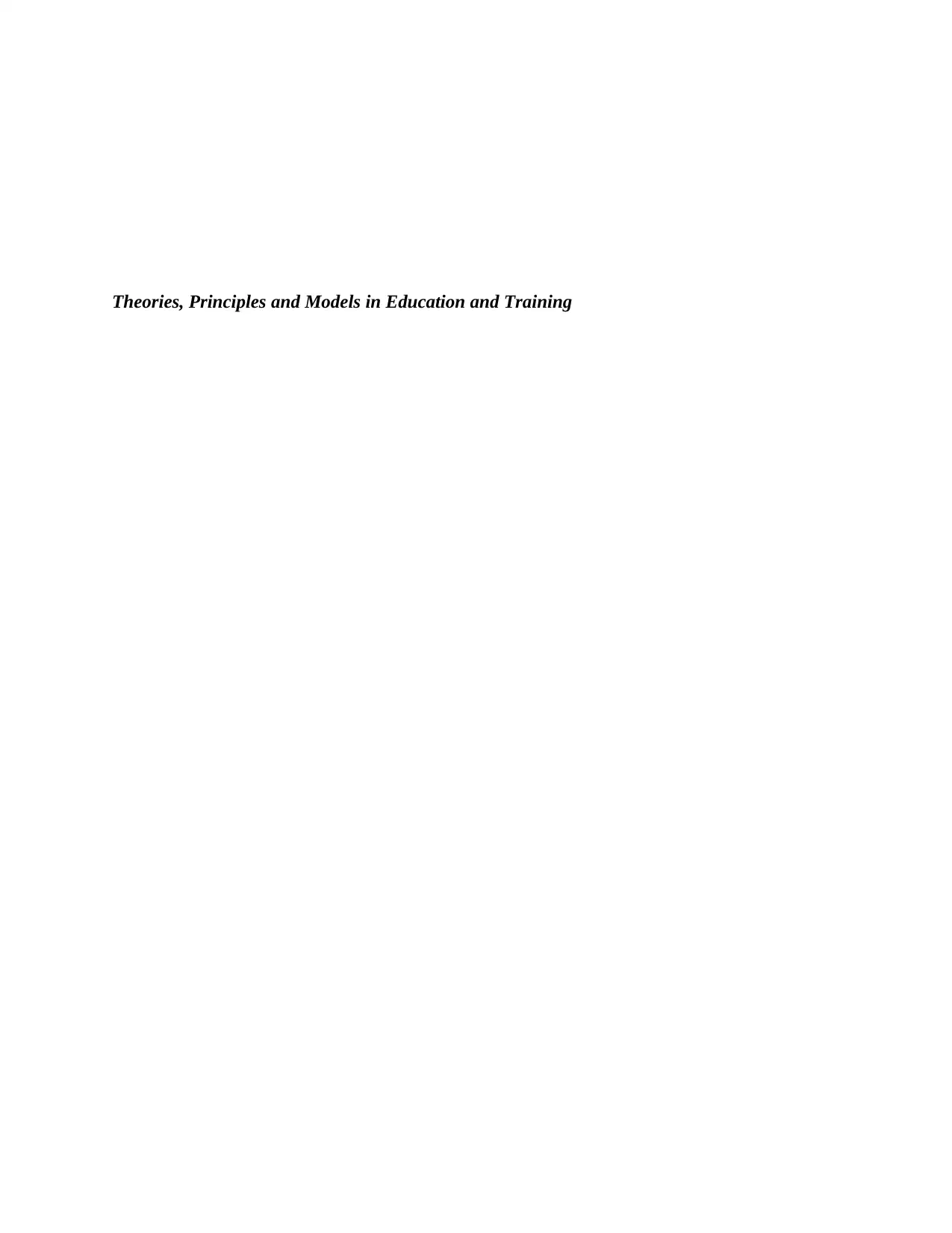
Theories, Principles and Models in Education and Training
Paraphrase This Document
Need a fresh take? Get an instant paraphrase of this document with our AI Paraphraser
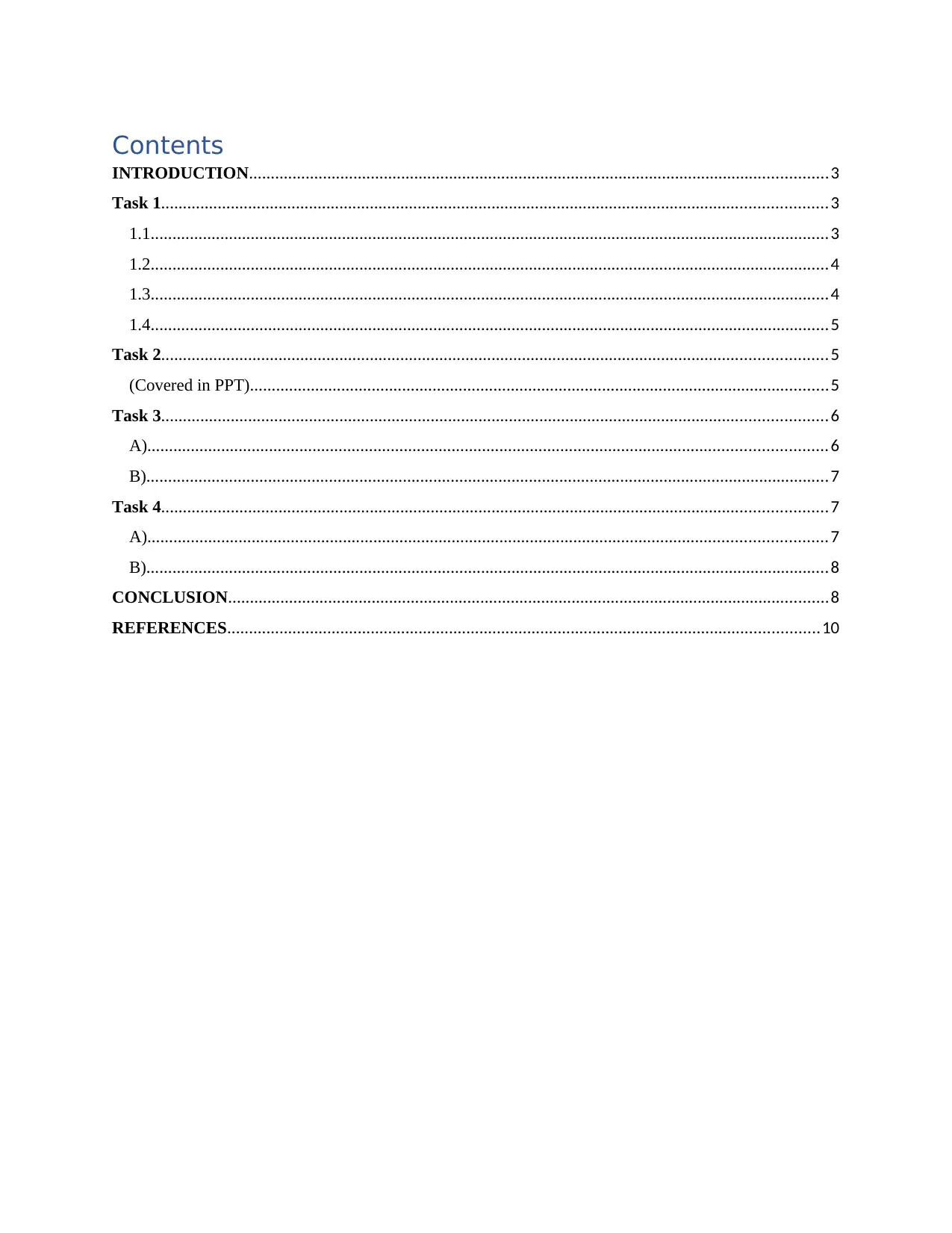
Contents
INTRODUCTION.....................................................................................................................................3
Task 1.........................................................................................................................................................3
1.1............................................................................................................................................................3
1.2............................................................................................................................................................4
1.3............................................................................................................................................................4
1.4............................................................................................................................................................5
Task 2.........................................................................................................................................................5
(Covered in PPT).....................................................................................................................................5
Task 3.........................................................................................................................................................6
A)............................................................................................................................................................6
B).............................................................................................................................................................7
Task 4.........................................................................................................................................................7
A)............................................................................................................................................................7
B).............................................................................................................................................................8
CONCLUSION..........................................................................................................................................8
REFERENCES........................................................................................................................................10
INTRODUCTION.....................................................................................................................................3
Task 1.........................................................................................................................................................3
1.1............................................................................................................................................................3
1.2............................................................................................................................................................4
1.3............................................................................................................................................................4
1.4............................................................................................................................................................5
Task 2.........................................................................................................................................................5
(Covered in PPT).....................................................................................................................................5
Task 3.........................................................................................................................................................6
A)............................................................................................................................................................6
B).............................................................................................................................................................7
Task 4.........................................................................................................................................................7
A)............................................................................................................................................................7
B).............................................................................................................................................................8
CONCLUSION..........................................................................................................................................8
REFERENCES........................................................................................................................................10
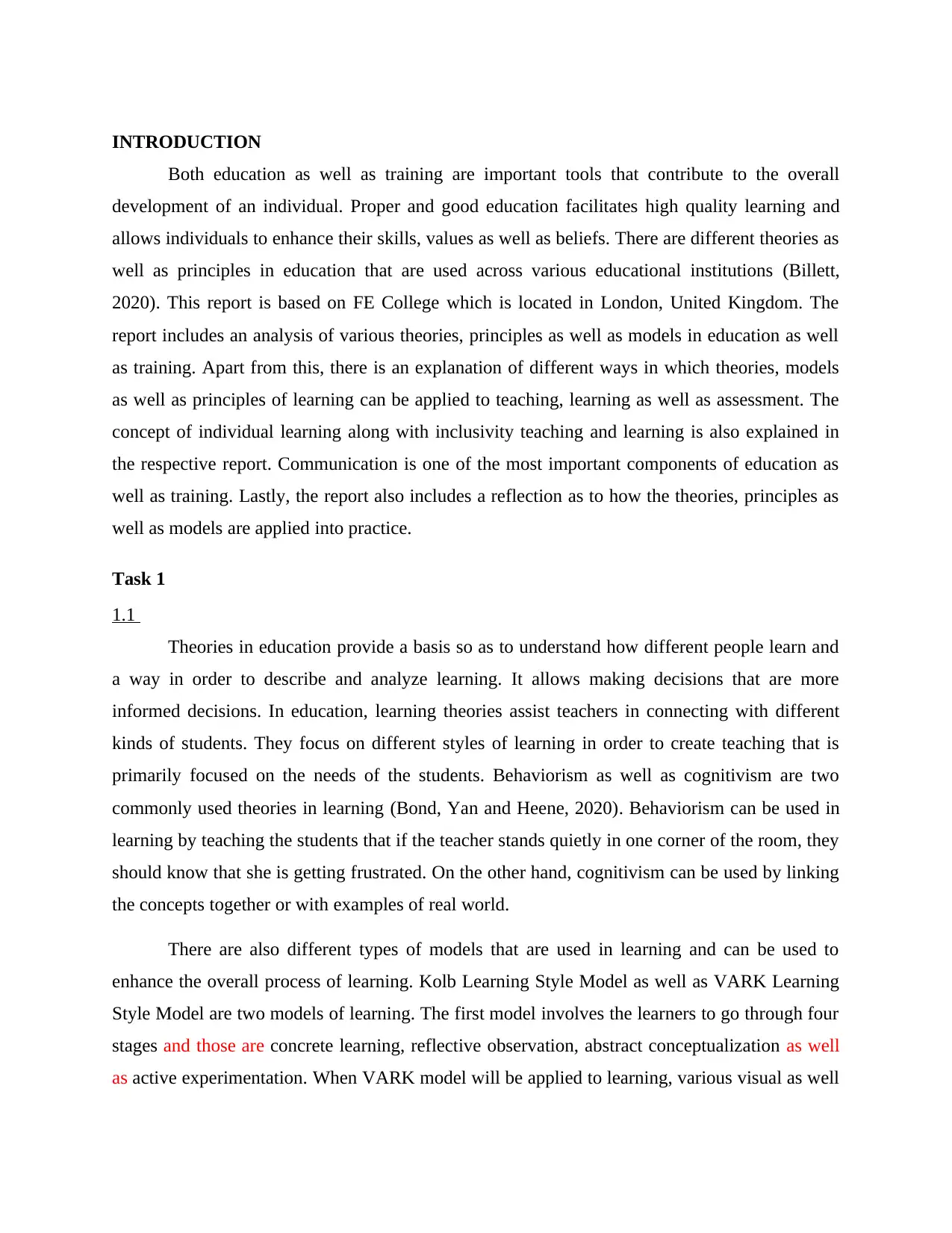
INTRODUCTION
Both education as well as training are important tools that contribute to the overall
development of an individual. Proper and good education facilitates high quality learning and
allows individuals to enhance their skills, values as well as beliefs. There are different theories as
well as principles in education that are used across various educational institutions (Billett,
2020). This report is based on FE College which is located in London, United Kingdom. The
report includes an analysis of various theories, principles as well as models in education as well
as training. Apart from this, there is an explanation of different ways in which theories, models
as well as principles of learning can be applied to teaching, learning as well as assessment. The
concept of individual learning along with inclusivity teaching and learning is also explained in
the respective report. Communication is one of the most important components of education as
well as training. Lastly, the report also includes a reflection as to how the theories, principles as
well as models are applied into practice.
Task 1
1.1
Theories in education provide a basis so as to understand how different people learn and
a way in order to describe and analyze learning. It allows making decisions that are more
informed decisions. In education, learning theories assist teachers in connecting with different
kinds of students. They focus on different styles of learning in order to create teaching that is
primarily focused on the needs of the students. Behaviorism as well as cognitivism are two
commonly used theories in learning (Bond, Yan and Heene, 2020). Behaviorism can be used in
learning by teaching the students that if the teacher stands quietly in one corner of the room, they
should know that she is getting frustrated. On the other hand, cognitivism can be used by linking
the concepts together or with examples of real world.
There are also different types of models that are used in learning and can be used to
enhance the overall process of learning. Kolb Learning Style Model as well as VARK Learning
Style Model are two models of learning. The first model involves the learners to go through four
stages and those are concrete learning, reflective observation, abstract conceptualization as well
as active experimentation. When VARK model will be applied to learning, various visual as well
Both education as well as training are important tools that contribute to the overall
development of an individual. Proper and good education facilitates high quality learning and
allows individuals to enhance their skills, values as well as beliefs. There are different theories as
well as principles in education that are used across various educational institutions (Billett,
2020). This report is based on FE College which is located in London, United Kingdom. The
report includes an analysis of various theories, principles as well as models in education as well
as training. Apart from this, there is an explanation of different ways in which theories, models
as well as principles of learning can be applied to teaching, learning as well as assessment. The
concept of individual learning along with inclusivity teaching and learning is also explained in
the respective report. Communication is one of the most important components of education as
well as training. Lastly, the report also includes a reflection as to how the theories, principles as
well as models are applied into practice.
Task 1
1.1
Theories in education provide a basis so as to understand how different people learn and
a way in order to describe and analyze learning. It allows making decisions that are more
informed decisions. In education, learning theories assist teachers in connecting with different
kinds of students. They focus on different styles of learning in order to create teaching that is
primarily focused on the needs of the students. Behaviorism as well as cognitivism are two
commonly used theories in learning (Bond, Yan and Heene, 2020). Behaviorism can be used in
learning by teaching the students that if the teacher stands quietly in one corner of the room, they
should know that she is getting frustrated. On the other hand, cognitivism can be used by linking
the concepts together or with examples of real world.
There are also different types of models that are used in learning and can be used to
enhance the overall process of learning. Kolb Learning Style Model as well as VARK Learning
Style Model are two models of learning. The first model involves the learners to go through four
stages and those are concrete learning, reflective observation, abstract conceptualization as well
as active experimentation. When VARK model will be applied to learning, various visual as well
⊘ This is a preview!⊘
Do you want full access?
Subscribe today to unlock all pages.

Trusted by 1+ million students worldwide
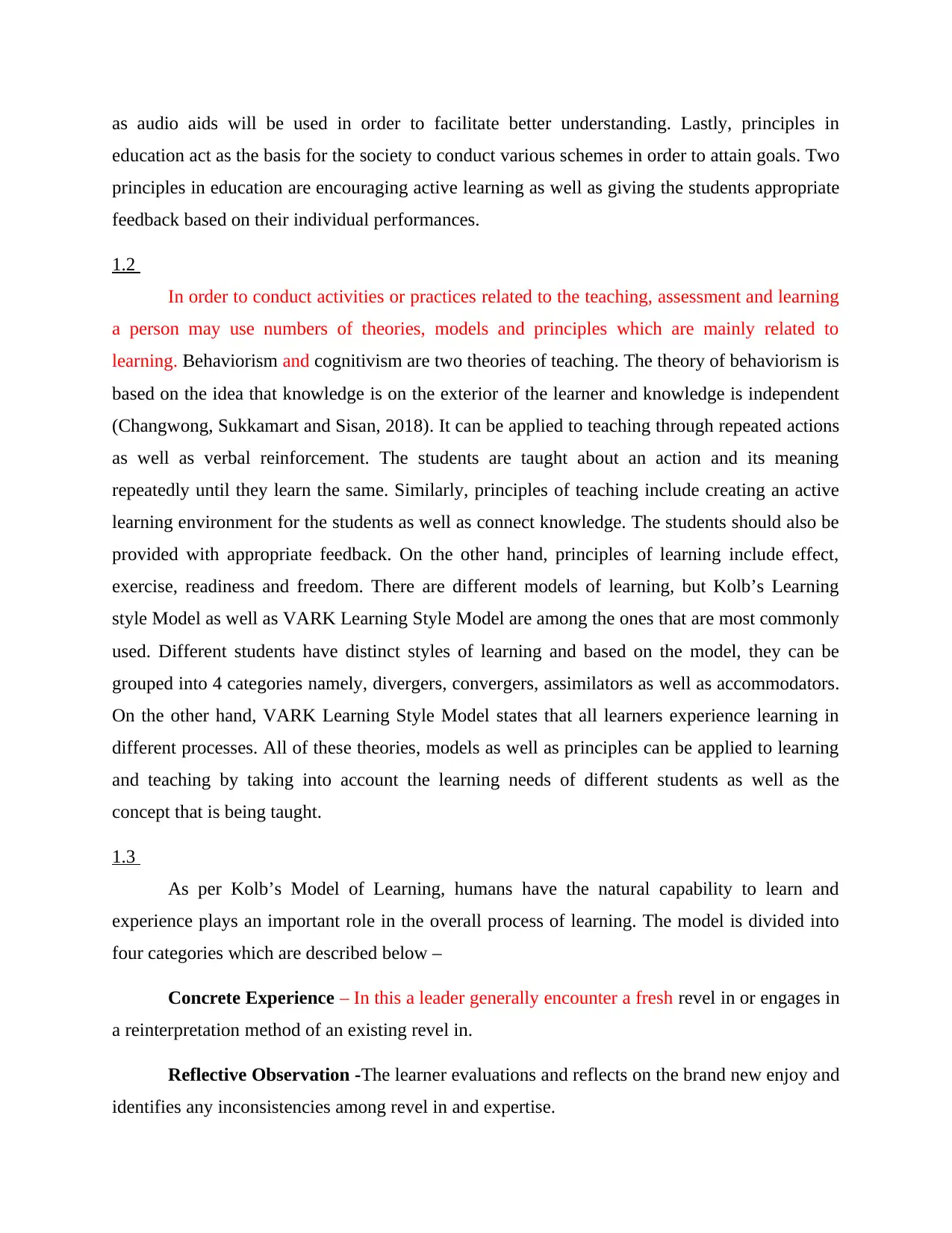
as audio aids will be used in order to facilitate better understanding. Lastly, principles in
education act as the basis for the society to conduct various schemes in order to attain goals. Two
principles in education are encouraging active learning as well as giving the students appropriate
feedback based on their individual performances.
1.2
In order to conduct activities or practices related to the teaching, assessment and learning
a person may use numbers of theories, models and principles which are mainly related to
learning. Behaviorism and cognitivism are two theories of teaching. The theory of behaviorism is
based on the idea that knowledge is on the exterior of the learner and knowledge is independent
(Changwong, Sukkamart and Sisan, 2018). It can be applied to teaching through repeated actions
as well as verbal reinforcement. The students are taught about an action and its meaning
repeatedly until they learn the same. Similarly, principles of teaching include creating an active
learning environment for the students as well as connect knowledge. The students should also be
provided with appropriate feedback. On the other hand, principles of learning include effect,
exercise, readiness and freedom. There are different models of learning, but Kolb’s Learning
style Model as well as VARK Learning Style Model are among the ones that are most commonly
used. Different students have distinct styles of learning and based on the model, they can be
grouped into 4 categories namely, divergers, convergers, assimilators as well as accommodators.
On the other hand, VARK Learning Style Model states that all learners experience learning in
different processes. All of these theories, models as well as principles can be applied to learning
and teaching by taking into account the learning needs of different students as well as the
concept that is being taught.
1.3
As per Kolb’s Model of Learning, humans have the natural capability to learn and
experience plays an important role in the overall process of learning. The model is divided into
four categories which are described below –
Concrete Experience – In this a leader generally encounter a fresh revel in or engages in
a reinterpretation method of an existing revel in.
Reflective Observation -The learner evaluations and reflects on the brand new enjoy and
identifies any inconsistencies among revel in and expertise.
education act as the basis for the society to conduct various schemes in order to attain goals. Two
principles in education are encouraging active learning as well as giving the students appropriate
feedback based on their individual performances.
1.2
In order to conduct activities or practices related to the teaching, assessment and learning
a person may use numbers of theories, models and principles which are mainly related to
learning. Behaviorism and cognitivism are two theories of teaching. The theory of behaviorism is
based on the idea that knowledge is on the exterior of the learner and knowledge is independent
(Changwong, Sukkamart and Sisan, 2018). It can be applied to teaching through repeated actions
as well as verbal reinforcement. The students are taught about an action and its meaning
repeatedly until they learn the same. Similarly, principles of teaching include creating an active
learning environment for the students as well as connect knowledge. The students should also be
provided with appropriate feedback. On the other hand, principles of learning include effect,
exercise, readiness and freedom. There are different models of learning, but Kolb’s Learning
style Model as well as VARK Learning Style Model are among the ones that are most commonly
used. Different students have distinct styles of learning and based on the model, they can be
grouped into 4 categories namely, divergers, convergers, assimilators as well as accommodators.
On the other hand, VARK Learning Style Model states that all learners experience learning in
different processes. All of these theories, models as well as principles can be applied to learning
and teaching by taking into account the learning needs of different students as well as the
concept that is being taught.
1.3
As per Kolb’s Model of Learning, humans have the natural capability to learn and
experience plays an important role in the overall process of learning. The model is divided into
four categories which are described below –
Concrete Experience – In this a leader generally encounter a fresh revel in or engages in
a reinterpretation method of an existing revel in.
Reflective Observation -The learner evaluations and reflects on the brand new enjoy and
identifies any inconsistencies among revel in and expertise.
Paraphrase This Document
Need a fresh take? Get an instant paraphrase of this document with our AI Paraphraser
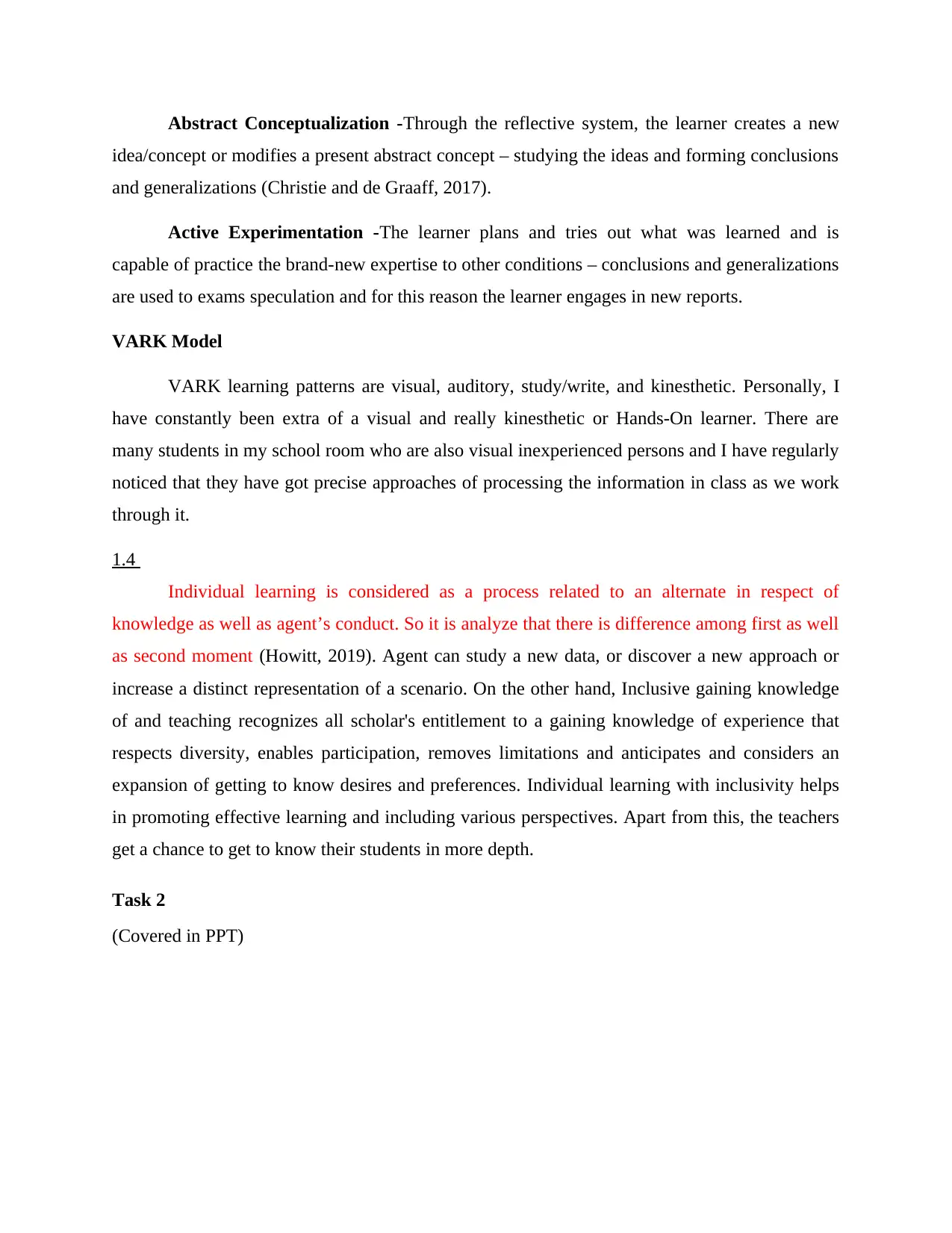
Abstract Conceptualization -Through the reflective system, the learner creates a new
idea/concept or modifies a present abstract concept – studying the ideas and forming conclusions
and generalizations (Christie and de Graaff, 2017).
Active Experimentation -The learner plans and tries out what was learned and is
capable of practice the brand-new expertise to other conditions – conclusions and generalizations
are used to exams speculation and for this reason the learner engages in new reports.
VARK Model
VARK learning patterns are visual, auditory, study/write, and kinesthetic. Personally, I
have constantly been extra of a visual and really kinesthetic or Hands-On learner. There are
many students in my school room who are also visual inexperienced persons and I have regularly
noticed that they have got precise approaches of processing the information in class as we work
through it.
1.4
Individual learning is considered as a process related to an alternate in respect of
knowledge as well as agent’s conduct. So it is analyze that there is difference among first as well
as second moment (Howitt, 2019). Agent can study a new data, or discover a new approach or
increase a distinct representation of a scenario. On the other hand, Inclusive gaining knowledge
of and teaching recognizes all scholar's entitlement to a gaining knowledge of experience that
respects diversity, enables participation, removes limitations and anticipates and considers an
expansion of getting to know desires and preferences. Individual learning with inclusivity helps
in promoting effective learning and including various perspectives. Apart from this, the teachers
get a chance to get to know their students in more depth.
Task 2
(Covered in PPT)
idea/concept or modifies a present abstract concept – studying the ideas and forming conclusions
and generalizations (Christie and de Graaff, 2017).
Active Experimentation -The learner plans and tries out what was learned and is
capable of practice the brand-new expertise to other conditions – conclusions and generalizations
are used to exams speculation and for this reason the learner engages in new reports.
VARK Model
VARK learning patterns are visual, auditory, study/write, and kinesthetic. Personally, I
have constantly been extra of a visual and really kinesthetic or Hands-On learner. There are
many students in my school room who are also visual inexperienced persons and I have regularly
noticed that they have got precise approaches of processing the information in class as we work
through it.
1.4
Individual learning is considered as a process related to an alternate in respect of
knowledge as well as agent’s conduct. So it is analyze that there is difference among first as well
as second moment (Howitt, 2019). Agent can study a new data, or discover a new approach or
increase a distinct representation of a scenario. On the other hand, Inclusive gaining knowledge
of and teaching recognizes all scholar's entitlement to a gaining knowledge of experience that
respects diversity, enables participation, removes limitations and anticipates and considers an
expansion of getting to know desires and preferences. Individual learning with inclusivity helps
in promoting effective learning and including various perspectives. Apart from this, the teachers
get a chance to get to know their students in more depth.
Task 2
(Covered in PPT)
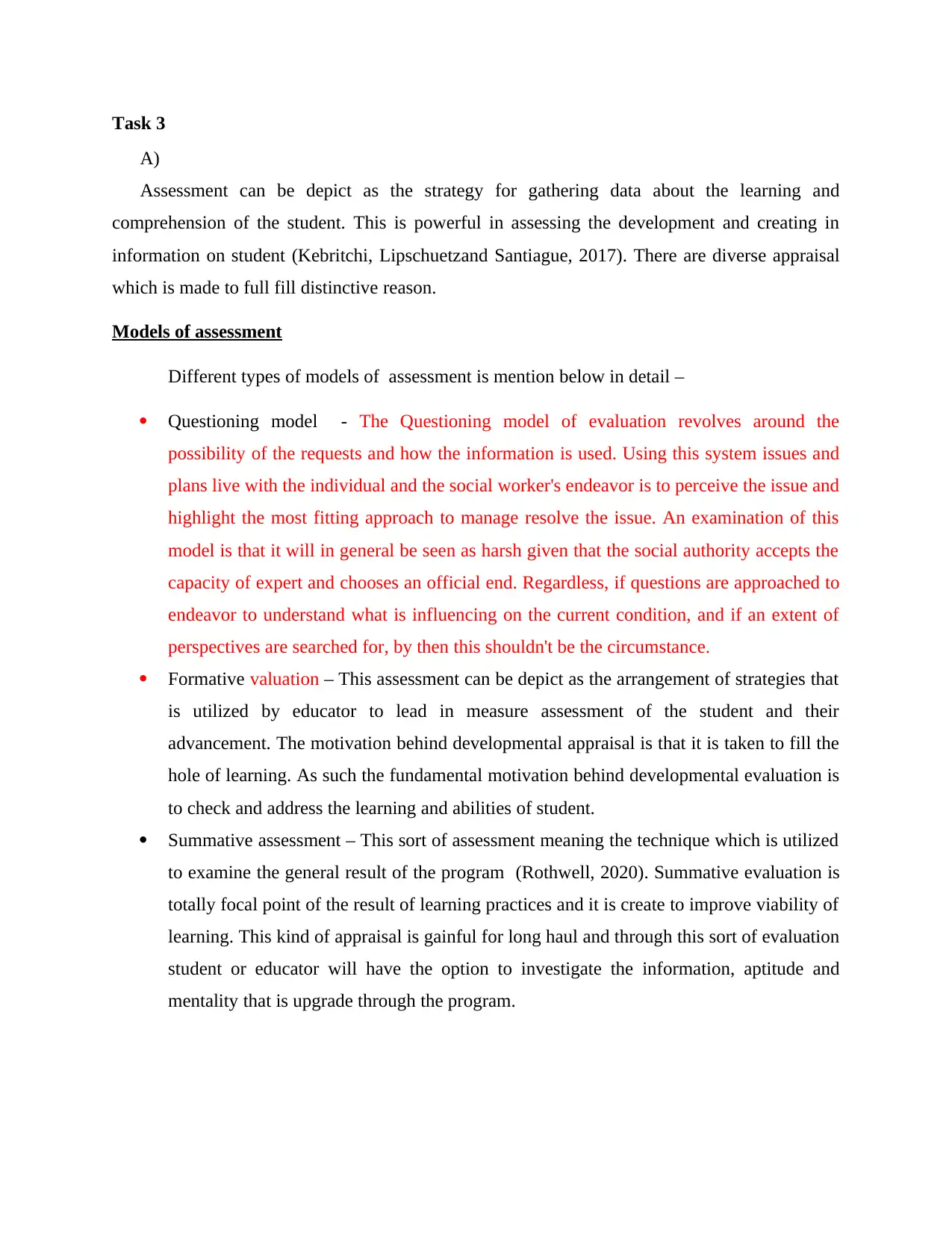
Task 3
A)
Assessment can be depict as the strategy for gathering data about the learning and
comprehension of the student. This is powerful in assessing the development and creating in
information on student (Kebritchi, Lipschuetzand Santiague, 2017). There are diverse appraisal
which is made to full fill distinctive reason.
Models of assessment
Different types of models of assessment is mention below in detail –
Questioning model - The Questioning model of evaluation revolves around the
possibility of the requests and how the information is used. Using this system issues and
plans live with the individual and the social worker's endeavor is to perceive the issue and
highlight the most fitting approach to manage resolve the issue. An examination of this
model is that it will in general be seen as harsh given that the social authority accepts the
capacity of expert and chooses an official end. Regardless, if questions are approached to
endeavor to understand what is influencing on the current condition, and if an extent of
perspectives are searched for, by then this shouldn't be the circumstance.
Formative valuation – This assessment can be depict as the arrangement of strategies that
is utilized by educator to lead in measure assessment of the student and their
advancement. The motivation behind developmental appraisal is that it is taken to fill the
hole of learning. As such the fundamental motivation behind developmental evaluation is
to check and address the learning and abilities of student.
Summative assessment – This sort of assessment meaning the technique which is utilized
to examine the general result of the program (Rothwell, 2020). Summative evaluation is
totally focal point of the result of learning practices and it is create to improve viability of
learning. This kind of appraisal is gainful for long haul and through this sort of evaluation
student or educator will have the option to investigate the information, aptitude and
mentality that is upgrade through the program.
A)
Assessment can be depict as the strategy for gathering data about the learning and
comprehension of the student. This is powerful in assessing the development and creating in
information on student (Kebritchi, Lipschuetzand Santiague, 2017). There are diverse appraisal
which is made to full fill distinctive reason.
Models of assessment
Different types of models of assessment is mention below in detail –
Questioning model - The Questioning model of evaluation revolves around the
possibility of the requests and how the information is used. Using this system issues and
plans live with the individual and the social worker's endeavor is to perceive the issue and
highlight the most fitting approach to manage resolve the issue. An examination of this
model is that it will in general be seen as harsh given that the social authority accepts the
capacity of expert and chooses an official end. Regardless, if questions are approached to
endeavor to understand what is influencing on the current condition, and if an extent of
perspectives are searched for, by then this shouldn't be the circumstance.
Formative valuation – This assessment can be depict as the arrangement of strategies that
is utilized by educator to lead in measure assessment of the student and their
advancement. The motivation behind developmental appraisal is that it is taken to fill the
hole of learning. As such the fundamental motivation behind developmental evaluation is
to check and address the learning and abilities of student.
Summative assessment – This sort of assessment meaning the technique which is utilized
to examine the general result of the program (Rothwell, 2020). Summative evaluation is
totally focal point of the result of learning practices and it is create to improve viability of
learning. This kind of appraisal is gainful for long haul and through this sort of evaluation
student or educator will have the option to investigate the information, aptitude and
mentality that is upgrade through the program.
⊘ This is a preview!⊘
Do you want full access?
Subscribe today to unlock all pages.

Trusted by 1+ million students worldwide
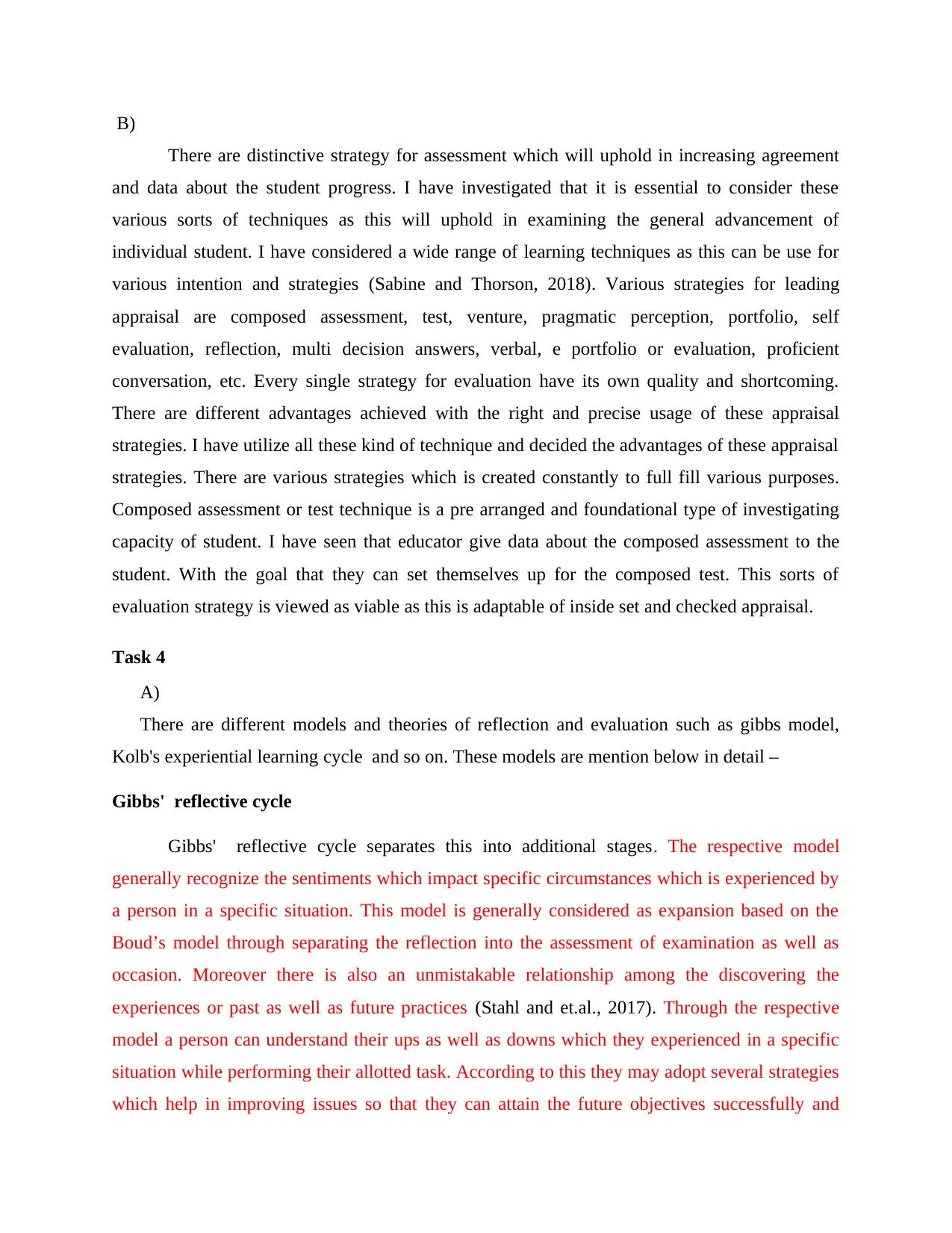
B)
There are distinctive strategy for assessment which will uphold in increasing agreement
and data about the student progress. I have investigated that it is essential to consider these
various sorts of techniques as this will uphold in examining the general advancement of
individual student. I have considered a wide range of learning techniques as this can be use for
various intention and strategies (Sabine and Thorson, 2018). Various strategies for leading
appraisal are composed assessment, test, venture, pragmatic perception, portfolio, self
evaluation, reflection, multi decision answers, verbal, e portfolio or evaluation, proficient
conversation, etc. Every single strategy for evaluation have its own quality and shortcoming.
There are different advantages achieved with the right and precise usage of these appraisal
strategies. I have utilize all these kind of technique and decided the advantages of these appraisal
strategies. There are various strategies which is created constantly to full fill various purposes.
Composed assessment or test technique is a pre arranged and foundational type of investigating
capacity of student. I have seen that educator give data about the composed assessment to the
student. With the goal that they can set themselves up for the composed test. This sorts of
evaluation strategy is viewed as viable as this is adaptable of inside set and checked appraisal.
Task 4
A)
There are different models and theories of reflection and evaluation such as gibbs model,
Kolb's experiential learning cycle and so on. These models are mention below in detail –
Gibbs' reflective cycle
Gibbs' reflective cycle separates this into additional stages. The respective model
generally recognize the sentiments which impact specific circumstances which is experienced by
a person in a specific situation. This model is generally considered as expansion based on the
Boud’s model through separating the reflection into the assessment of examination as well as
occasion. Moreover there is also an unmistakable relationship among the discovering the
experiences or past as well as future practices (Stahl and et.al., 2017). Through the respective
model a person can understand their ups as well as downs which they experienced in a specific
situation while performing their allotted task. According to this they may adopt several strategies
which help in improving issues so that they can attain the future objectives successfully and
There are distinctive strategy for assessment which will uphold in increasing agreement
and data about the student progress. I have investigated that it is essential to consider these
various sorts of techniques as this will uphold in examining the general advancement of
individual student. I have considered a wide range of learning techniques as this can be use for
various intention and strategies (Sabine and Thorson, 2018). Various strategies for leading
appraisal are composed assessment, test, venture, pragmatic perception, portfolio, self
evaluation, reflection, multi decision answers, verbal, e portfolio or evaluation, proficient
conversation, etc. Every single strategy for evaluation have its own quality and shortcoming.
There are different advantages achieved with the right and precise usage of these appraisal
strategies. I have utilize all these kind of technique and decided the advantages of these appraisal
strategies. There are various strategies which is created constantly to full fill various purposes.
Composed assessment or test technique is a pre arranged and foundational type of investigating
capacity of student. I have seen that educator give data about the composed assessment to the
student. With the goal that they can set themselves up for the composed test. This sorts of
evaluation strategy is viewed as viable as this is adaptable of inside set and checked appraisal.
Task 4
A)
There are different models and theories of reflection and evaluation such as gibbs model,
Kolb's experiential learning cycle and so on. These models are mention below in detail –
Gibbs' reflective cycle
Gibbs' reflective cycle separates this into additional stages. The respective model
generally recognize the sentiments which impact specific circumstances which is experienced by
a person in a specific situation. This model is generally considered as expansion based on the
Boud’s model through separating the reflection into the assessment of examination as well as
occasion. Moreover there is also an unmistakable relationship among the discovering the
experiences or past as well as future practices (Stahl and et.al., 2017). Through the respective
model a person can understand their ups as well as downs which they experienced in a specific
situation while performing their allotted task. According to this they may adopt several strategies
which help in improving issues so that they can attain the future objectives successfully and
Paraphrase This Document
Need a fresh take? Get an instant paraphrase of this document with our AI Paraphraser
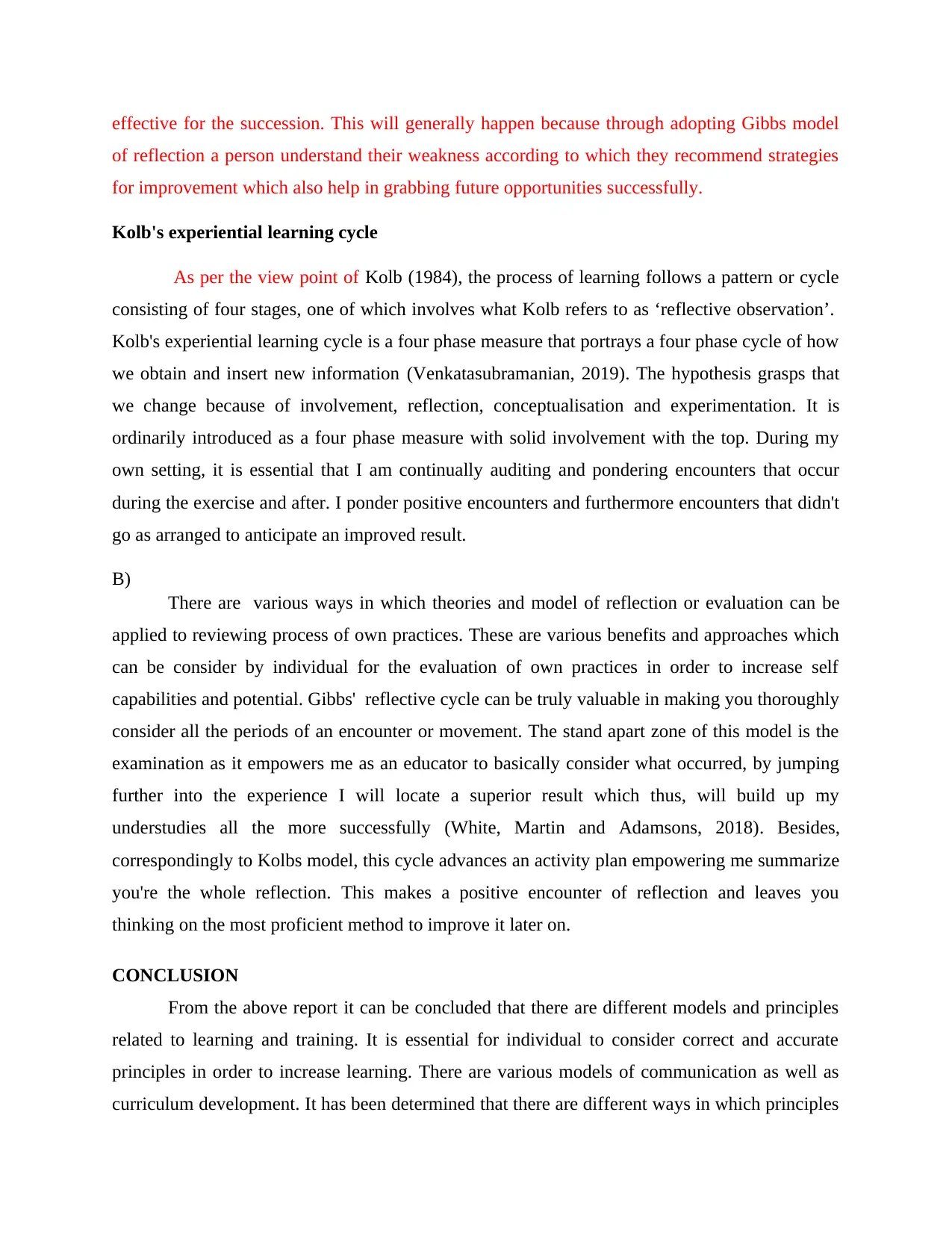
effective for the succession. This will generally happen because through adopting Gibbs model
of reflection a person understand their weakness according to which they recommend strategies
for improvement which also help in grabbing future opportunities successfully.
Kolb's experiential learning cycle
As per the view point of Kolb (1984), the process of learning follows a pattern or cycle
consisting of four stages, one of which involves what Kolb refers to as ‘reflective observation’.
Kolb's experiential learning cycle is a four phase measure that portrays a four phase cycle of how
we obtain and insert new information (Venkatasubramanian, 2019). The hypothesis grasps that
we change because of involvement, reflection, conceptualisation and experimentation. It is
ordinarily introduced as a four phase measure with solid involvement with the top. During my
own setting, it is essential that I am continually auditing and pondering encounters that occur
during the exercise and after. I ponder positive encounters and furthermore encounters that didn't
go as arranged to anticipate an improved result.
B)
There are various ways in which theories and model of reflection or evaluation can be
applied to reviewing process of own practices. These are various benefits and approaches which
can be consider by individual for the evaluation of own practices in order to increase self
capabilities and potential. Gibbs' reflective cycle can be truly valuable in making you thoroughly
consider all the periods of an encounter or movement. The stand apart zone of this model is the
examination as it empowers me as an educator to basically consider what occurred, by jumping
further into the experience I will locate a superior result which thus, will build up my
understudies all the more successfully (White, Martin and Adamsons, 2018). Besides,
correspondingly to Kolbs model, this cycle advances an activity plan empowering me summarize
you're the whole reflection. This makes a positive encounter of reflection and leaves you
thinking on the most proficient method to improve it later on.
CONCLUSION
From the above report it can be concluded that there are different models and principles
related to learning and training. It is essential for individual to consider correct and accurate
principles in order to increase learning. There are various models of communication as well as
curriculum development. It has been determined that there are different ways in which principles
of reflection a person understand their weakness according to which they recommend strategies
for improvement which also help in grabbing future opportunities successfully.
Kolb's experiential learning cycle
As per the view point of Kolb (1984), the process of learning follows a pattern or cycle
consisting of four stages, one of which involves what Kolb refers to as ‘reflective observation’.
Kolb's experiential learning cycle is a four phase measure that portrays a four phase cycle of how
we obtain and insert new information (Venkatasubramanian, 2019). The hypothesis grasps that
we change because of involvement, reflection, conceptualisation and experimentation. It is
ordinarily introduced as a four phase measure with solid involvement with the top. During my
own setting, it is essential that I am continually auditing and pondering encounters that occur
during the exercise and after. I ponder positive encounters and furthermore encounters that didn't
go as arranged to anticipate an improved result.
B)
There are various ways in which theories and model of reflection or evaluation can be
applied to reviewing process of own practices. These are various benefits and approaches which
can be consider by individual for the evaluation of own practices in order to increase self
capabilities and potential. Gibbs' reflective cycle can be truly valuable in making you thoroughly
consider all the periods of an encounter or movement. The stand apart zone of this model is the
examination as it empowers me as an educator to basically consider what occurred, by jumping
further into the experience I will locate a superior result which thus, will build up my
understudies all the more successfully (White, Martin and Adamsons, 2018). Besides,
correspondingly to Kolbs model, this cycle advances an activity plan empowering me summarize
you're the whole reflection. This makes a positive encounter of reflection and leaves you
thinking on the most proficient method to improve it later on.
CONCLUSION
From the above report it can be concluded that there are different models and principles
related to learning and training. It is essential for individual to consider correct and accurate
principles in order to increase learning. There are various models of communication as well as
curriculum development. It has been determined that there are different ways in which principles
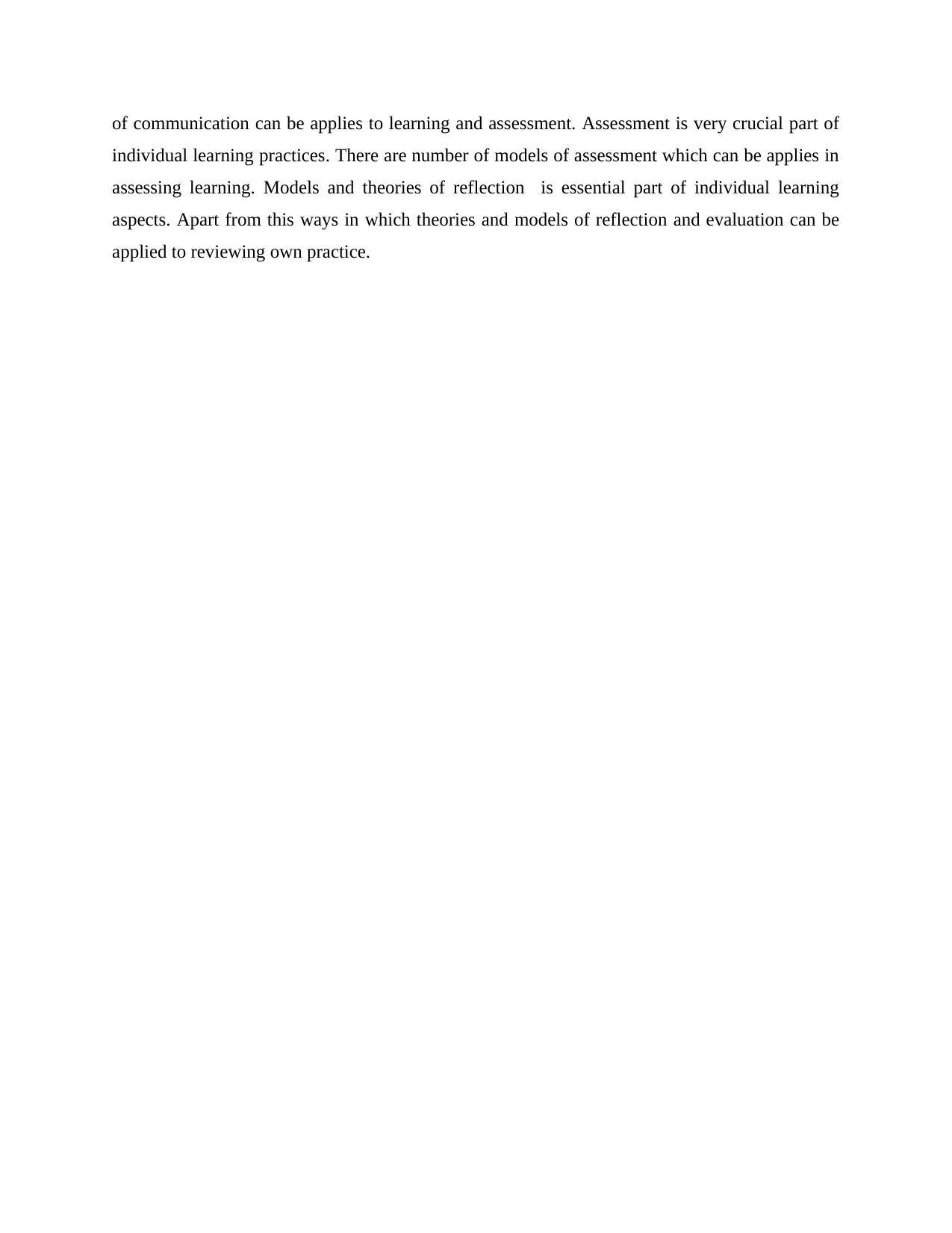
of communication can be applies to learning and assessment. Assessment is very crucial part of
individual learning practices. There are number of models of assessment which can be applies in
assessing learning. Models and theories of reflection is essential part of individual learning
aspects. Apart from this ways in which theories and models of reflection and evaluation can be
applied to reviewing own practice.
individual learning practices. There are number of models of assessment which can be applies in
assessing learning. Models and theories of reflection is essential part of individual learning
aspects. Apart from this ways in which theories and models of reflection and evaluation can be
applied to reviewing own practice.
⊘ This is a preview!⊘
Do you want full access?
Subscribe today to unlock all pages.

Trusted by 1+ million students worldwide
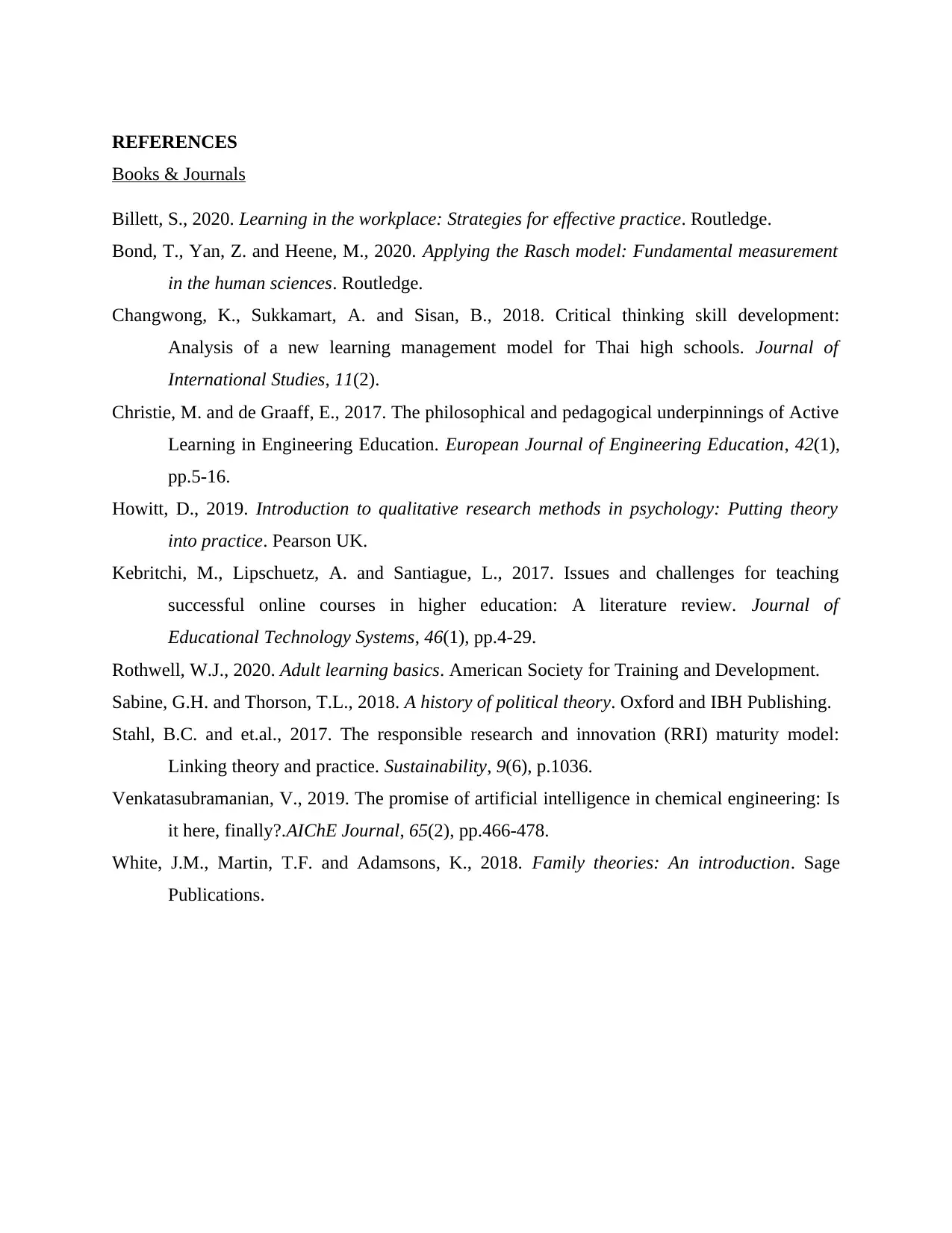
REFERENCES
Books & Journals
Billett, S., 2020. Learning in the workplace: Strategies for effective practice. Routledge.
Bond, T., Yan, Z. and Heene, M., 2020. Applying the Rasch model: Fundamental measurement
in the human sciences. Routledge.
Changwong, K., Sukkamart, A. and Sisan, B., 2018. Critical thinking skill development:
Analysis of a new learning management model for Thai high schools. Journal of
International Studies, 11(2).
Christie, M. and de Graaff, E., 2017. The philosophical and pedagogical underpinnings of Active
Learning in Engineering Education. European Journal of Engineering Education, 42(1),
pp.5-16.
Howitt, D., 2019. Introduction to qualitative research methods in psychology: Putting theory
into practice. Pearson UK.
Kebritchi, M., Lipschuetz, A. and Santiague, L., 2017. Issues and challenges for teaching
successful online courses in higher education: A literature review. Journal of
Educational Technology Systems, 46(1), pp.4-29.
Rothwell, W.J., 2020. Adult learning basics. American Society for Training and Development.
Sabine, G.H. and Thorson, T.L., 2018. A history of political theory. Oxford and IBH Publishing.
Stahl, B.C. and et.al., 2017. The responsible research and innovation (RRI) maturity model:
Linking theory and practice. Sustainability, 9(6), p.1036.
Venkatasubramanian, V., 2019. The promise of artificial intelligence in chemical engineering: Is
it here, finally?.AIChE Journal, 65(2), pp.466-478.
White, J.M., Martin, T.F. and Adamsons, K., 2018. Family theories: An introduction. Sage
Publications.
Books & Journals
Billett, S., 2020. Learning in the workplace: Strategies for effective practice. Routledge.
Bond, T., Yan, Z. and Heene, M., 2020. Applying the Rasch model: Fundamental measurement
in the human sciences. Routledge.
Changwong, K., Sukkamart, A. and Sisan, B., 2018. Critical thinking skill development:
Analysis of a new learning management model for Thai high schools. Journal of
International Studies, 11(2).
Christie, M. and de Graaff, E., 2017. The philosophical and pedagogical underpinnings of Active
Learning in Engineering Education. European Journal of Engineering Education, 42(1),
pp.5-16.
Howitt, D., 2019. Introduction to qualitative research methods in psychology: Putting theory
into practice. Pearson UK.
Kebritchi, M., Lipschuetz, A. and Santiague, L., 2017. Issues and challenges for teaching
successful online courses in higher education: A literature review. Journal of
Educational Technology Systems, 46(1), pp.4-29.
Rothwell, W.J., 2020. Adult learning basics. American Society for Training and Development.
Sabine, G.H. and Thorson, T.L., 2018. A history of political theory. Oxford and IBH Publishing.
Stahl, B.C. and et.al., 2017. The responsible research and innovation (RRI) maturity model:
Linking theory and practice. Sustainability, 9(6), p.1036.
Venkatasubramanian, V., 2019. The promise of artificial intelligence in chemical engineering: Is
it here, finally?.AIChE Journal, 65(2), pp.466-478.
White, J.M., Martin, T.F. and Adamsons, K., 2018. Family theories: An introduction. Sage
Publications.
1 out of 10
Related Documents
Your All-in-One AI-Powered Toolkit for Academic Success.
+13062052269
info@desklib.com
Available 24*7 on WhatsApp / Email
![[object Object]](/_next/static/media/star-bottom.7253800d.svg)
Unlock your academic potential
Copyright © 2020–2026 A2Z Services. All Rights Reserved. Developed and managed by ZUCOL.




